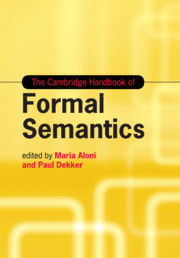Book contents
- Frontmatter
- Contents
- List of figures
- List of tables
- List of contributors
- Preface
- Part I The landscape of formal semantics
- Part II Theory of reference and quantification
- Part III Temporal and aspectual ontology and other semantic structures
- 11 Tense
- 12 Aspect
- 13 Mereology
- 14 Vagueness
- 15 Modification
- Part IV Intensionality and force
- Part V The interfaces
- Bibliography
- Index
15 - Modification
from Part III - Temporal and aspectual ontology and other semantic structures
Published online by Cambridge University Press: 05 July 2016
- Frontmatter
- Contents
- List of figures
- List of tables
- List of contributors
- Preface
- Part I The landscape of formal semantics
- Part II Theory of reference and quantification
- Part III Temporal and aspectual ontology and other semantic structures
- 11 Tense
- 12 Aspect
- 13 Mereology
- 14 Vagueness
- 15 Modification
- Part IV Intensionality and force
- Part V The interfaces
- Bibliography
- Index
Summary
Introduction
The term modifier (and modification, the function a modifier carries out) is difficult to define in intuitive terms. A first informal approximation might be, for example, to say that a modifier adds additional, non-essential descriptive content to that contributed by the expression that it combines with; in this respect, a modifier would contrast with an argument, which would provide descriptive content that is somehow required by the expression it combines with. For instance, one could try to argue that in (1), the content contributed by delightful is less essential to determining the referent of the whole nominal than that contributed by of Susan, and thus we could conclude that the former is a modifier, while the latter is an argument:
(1) the delightful mother of Susan
However, this sort of reasoning has long been known to be problematic, as the large literature on the argument/nonargument distinction in the argument structure literature makes clear. For example, consider (2):
(2) the younger sister of Susan
If Susan has two sisters, the content contributed by the adjective is arguably as important as that contributed by the prepositional phrase for identifying the referent of the nominal. However, such adjectives are universally treated as modifiers, not arguments. A classic example from the verbal domain involves the verbs buy, sell, rent, and lease: Money is an essential participant in the situations these verbs describe, and yet the for-phrase in (3) is not treated as an argument (see, e.g., Jackendoff, 1972, for an early discussion of this problem):
(3) We sold the car (to the dealer) for 2000 euros.
Syntactic obligatoriness is even more problematic as a criterion for defining modifiers, asmany expressions that linguists would agree are arguments are syntactically elidable (such as to the dealer in (3)), and sometimes modifiers are obligatory, if arguably only for pragmatic reasons (see, e.g.,??a built house vs. a well-built house, Goldberg and Ackerman, 2001). Consequently, in this article, modifier and modification will be defined in strictly formal terms.
- Type
- Chapter
- Information
- The Cambridge Handbook of Formal Semantics , pp. 442 - 464Publisher: Cambridge University PressPrint publication year: 2016
- 12
- Cited by



